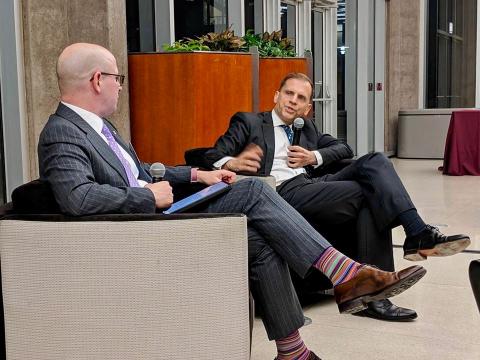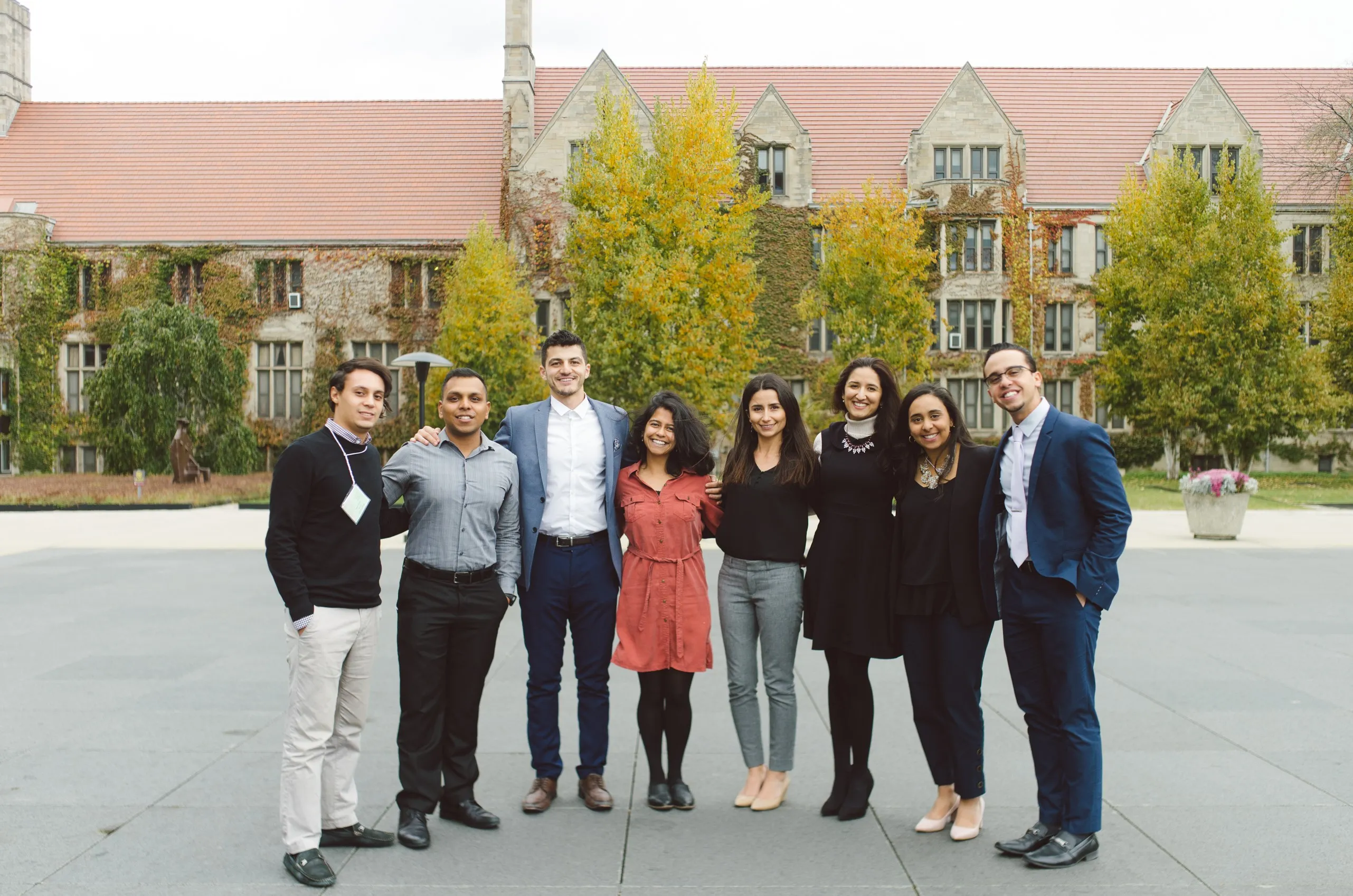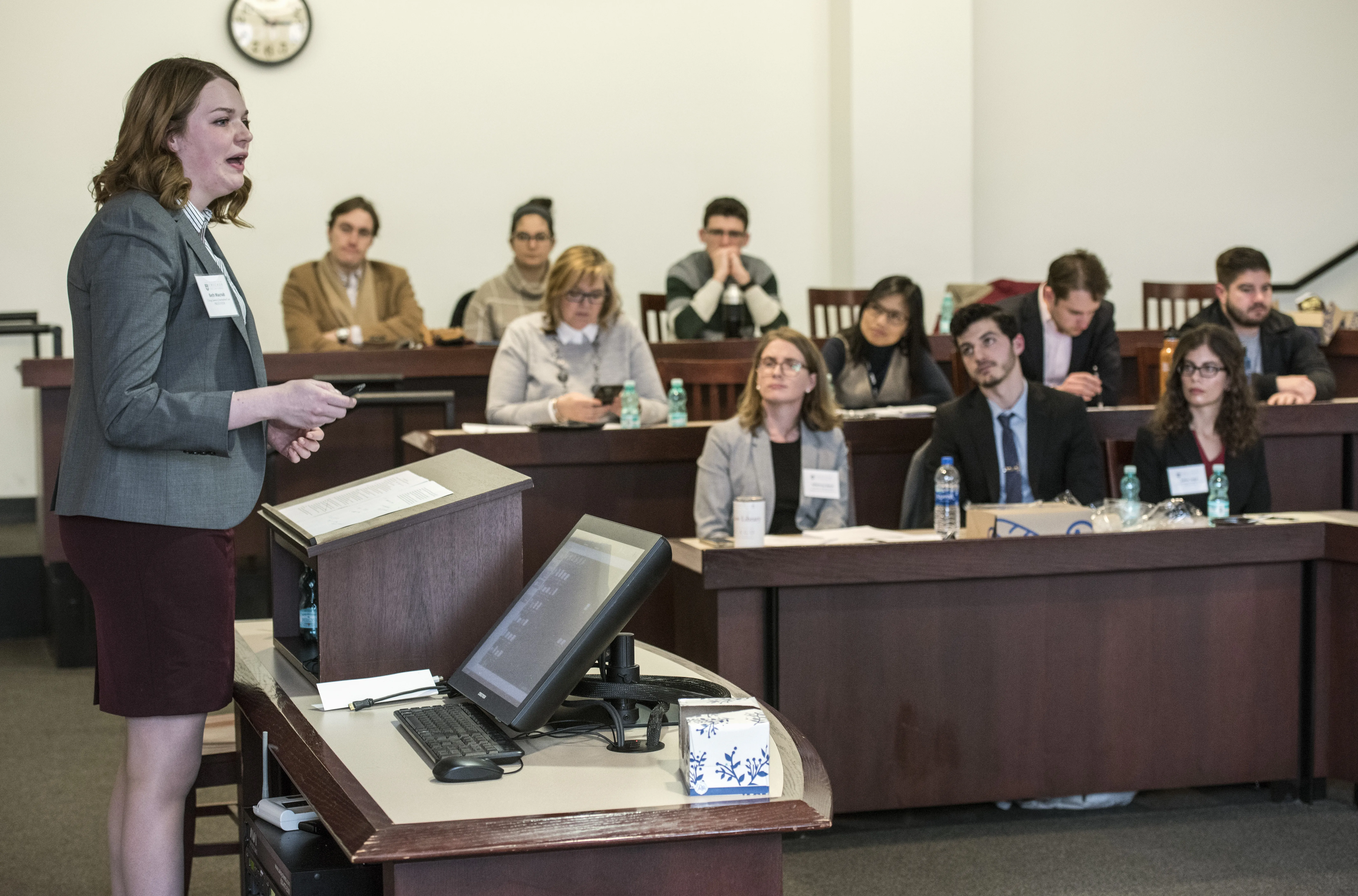Understanding the New Legal Landscape

Lecturer Robert Gasaway, ’92, looked out at a packed classroom during a day-long Federalist Society symposium last month and offered up a claim: Administrative law is so coherent and orderly, he said, that it could be summarized in a single—albeit lengthy—sentence touching on its most important topics.
And, with that, the debate had begun. He and his fellow panelists—Aditya Bamzai, ’04, a law professor at the University of Virginia; Kristin Hickman, a law professor at the University of Minnesota; and Jonathan Adler, a law professor at Case Western Reserve University—walked through Gasaway’s sentence clause by clause, debating facets of administrative law like Chevron and Auer deference, independent agencies, justiciability, and the nondelegation doctrine.
Although administrative law was not the most obviously controversial topic on the day’s agenda, the discussion highlighted the central theme of the second annual conference hosted by the Law School’s chapter of the Federalist Society: understanding the arguments on all sides of important legal topics likely to appear on the Supreme Court’s docket in the coming years.
“Moderating [this] discussion was a rare treat,” Gasaway said later. “Our panel included expertise in administrative law history and doctrine, and in the practical application of ad-law in the Supreme Court. Kudos to the conference organizers.”
The symposium, which also included in-depth discussions on affirmative action and religious liberty, drew more than 100 attendees. Many were law students from the University of Chicago and other Chicago-area law schools, as well as schools outside the state, including the University of Michigan and the University of Wisconsin. Local attorneys also attended, and the symposium provided Illinois CLE credit.
“I really enjoyed attending the symposium and hearing experts discuss how these legal issues are being treated in courts right now,” Anne Jiang, ’21, said. “It was also a cool opportunity to meet practicing lawyers and hear their insights.”
Each panel of experts tackled one topic in depth, discussing the current state of doctrine, scholarly disagreement, ongoing litigation, and how the views of particular Supreme Court justices might influence outcomes in prospective cases.
“This was a great and fun event, where I had the chance to talk about cutting-edge issues with leading judges, scholars, and practitioners—as well as a group of sharp and engaged law students from across the Midwest,” Bamzai said.
The Law School’s Federalist Society held its first symposium last year, an idea that grew out of similar events organized by other student chapters and by the national organization.
The student organization—part of a national libertarian and conservative group that was founded in 1982 by law students from the University of Chicago, Yale, and Harvard—hosts more than 40 lunch talks at the Law School each year. Speakers address a wide range of issues, often connected to the Federalist Society’s animating principles: that the state exists to preserve freedom, the separation of powers is central to the Constitution, and the role of the judiciary is to say what the law is, not what it should be.
This year’s events have featured Judge Jerry E. Smith of the United States Court of Appeals for the Fifth Circuit and two of his former law clerks who are now federal appellate judges (Fifth Circuit Judge James C. Ho, ’99, and Sixth Circuit Judge John B. Nalbandian) discussing their lives in the law, as well as Seventh Circuit Judge Michael B. Brennan, who spoke on “Thoughts on Legal Reasoning,” and Justice Thomas Lee of the Utah Supreme Court, who discussed the growing field of corpus linguistics. The talks attracted an average attendance of almost 100 students per event over the course of two quarters—a record high. The Federalist Society also hosts a book club, social events like karaoke, and a big welcome-to-school barbecue to kick off the year each fall.
“The Federalist Society brings in professors, practitioners, and judges to show students diverse ideas in the legal academy,” said chapter president Eric Wessan, ’19. “The group brings thoughtful conservatives and libertarians to campus to provide perspectives that students might not otherwise be exposed to.”
The February symposium’s panel on affirmative action was moderated by Ho and included Lecturer Adam Mortara, ’01, and Jonathan Mitchell, ’01. Mortara discussed Students for Fair Admissions v. Harvard College, ongoing litigation about the legality of Harvard’s affirmative action program in which Mortara is counsel of record. The suit argues that Harvard’s approach is illegal based on current precedent. If it is appealed, it could give the Supreme Court a chance to change the entire area of affirmative action law. Mitchell described lawsuits against the New York University and Harvard law reviews, arguing that their affirmative action policies for selecting their members are unconstitutional based on current precedent.
The religious liberty panel discussed the vitality of the Lemon test, the “Peace Cross” case currently before the Supreme Court, and—more broadly—the shift of religious liberty litigation over past decades from minority religions seeking small-scale accommodations to clashes between religious liberty and other constitutional values like speech and equal protection. It was moderated by Professor Rick Garnett and included Vincent Phillip Muñoz, a law professor at the University of Notre Dame; Christopher Lund, a law professor at Wayne State University; Stephanie Barclay, a law professor at Brigham Young University; and Alexander Tsesis, a law professor at Loyola University Chicago.
The symposium concluded with a dinnertime conversation between Mortara and DC Circuit Judge Greg Katsas. They discussed Katsas’s litigation career prior to his nomination—including, most prominently, arguing Boumediene v. Bush in the DC Circuit and NFIB v. Sebelius before the Supreme Court. They also discussed his experience in the executive branch and the differences in pace between the kinds of legal practice.
Wessan was thrilled with how the conference turned out.
“I am incredibly grateful to all of the wonderful speakers who came to our symposium and to our keynote speaker, Judge Katsas,” he said. “Without speakers willing to brave Chicago's winter, we could not put on such important programming for our students."



